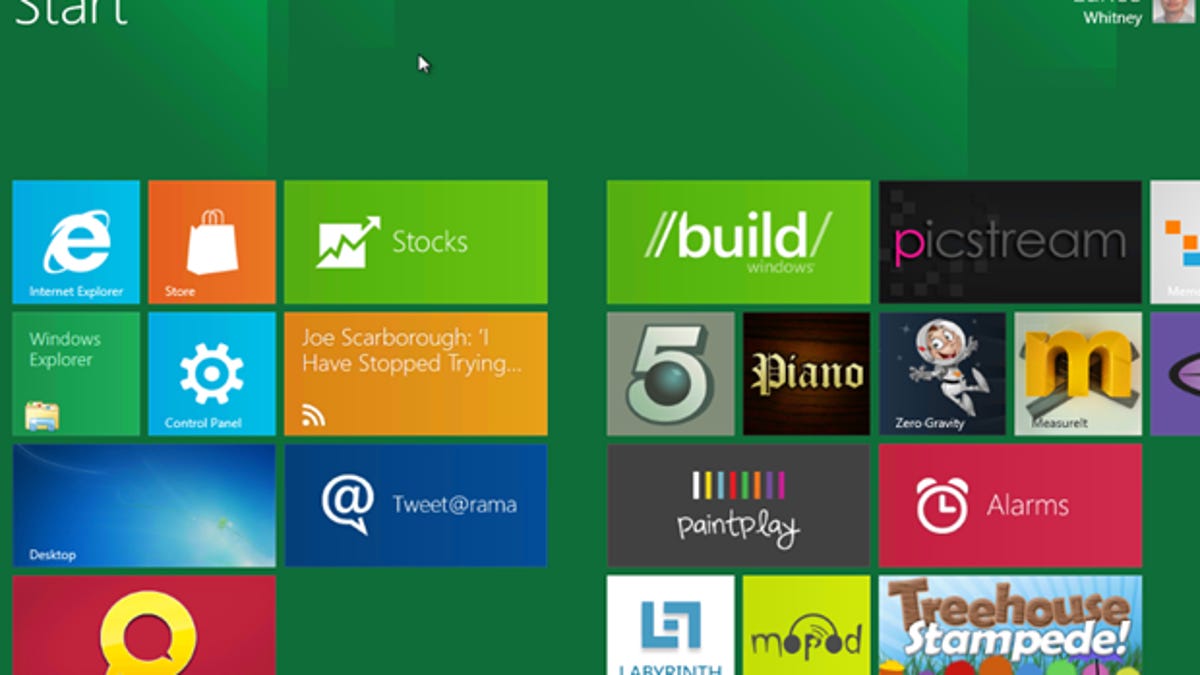Will Windows 8 be irrelevant to regular PC users?
In a dire prediction for Microsoft for 2012, research firm IDC forecasts that most Windows 7 PC users won't bother to upgrade to Windows 8.

Will the average Windows PC user jump to Windows 8 next year or snub the new OS as a platform geared more for mobile devices?
Weighing in with a strong opinion on that question is research firm IDC, which recently unveiled a list of its top ten predictions for 2012. Key among them was one forecast eyeing doom and gloom for Windows 8, certainly in the desktop arena.
The next version of Windows will be Microsoft's first attempt to offer the same operating system for both PCs and mobile devices. IDC expects Windows 8 products to hit the market by August 2012 and possibly as early as the second quarter if Microsoft can move fast enough.
But whenever Windows 8 is released, IDC doesn't see much excitement among the desktop crowd.
"Windows 8 will be largely irrelevant to the users of traditional PCs, and we expect effectively no upgrade activity from Windows 7 to Windows 8 in that form factor," the report said.
Though the research firm didn't reveal the specific reasons for its dire prediction, it's easy enough to guess.
Since the release of the Windows 8 Developer Preview in September, Microsoft has been battered by criticism from desktop users over the new Metro interface. In addition to those who just don't like the new look and feel, many have complained that the touch-based UI simply doesn't work well with a mouse and keyboard.
Behind the scenes of the Metro UI, Windows 8 will still offer the standard desktop that users know. But based on the Developer Preview, the desktop looks the same as it does in Windows 7. So users already turned off by the Metro interface may feel little or no reason to upgrade.
In response, Microsoft has cautioned people that the Developer Preview is far from the final product and has promised to tweak Windows 8 to work more smoothly on a desktop environment. The company has also tried to explain and promote all of the new features in Windows 8 through its Building Windows 8 blog. But many people remain skeptical.
The enterprise market may also be slow to adopt Windows 8 on its desktops and laptops. Many companies have already upgraded to Windows 7 or are in the middle of a migration, points out ZDNet's Mary Jo Foley. Since a lot of businesses only upgrade every other version, Windows 8 could be bypassed by a significant number.
Ironically, Microsoft itself has told enterprises still running Windows XP to jump to Windows 7 and not wait for Windows 8, advice that many will probably take.
Windows Server 8
On a brighter note, IDC does have high expectations for Windows Server 8. With new enhancements to the Hyper-V environment, the server edition could be a good option for businesses setting up private cloud deployments.
"Windows Server 8 will be widely embraced by Microsoft customers," the report said.
But Windows 8 is likely to face challenges in the mobile arena. Microsoft is counting on its new OS to make a dent in the tablet world, a market where the company has so far languished. And though Windows 8 is being designed as a tablet-friendly platform, Microsoft's success in this area is by no means assured.
"There will be intense scrutiny on Microsoft's ability to deliver a successful tablet experience aboard both x86-based tablets and on devices running ARM processors," noted the report. "This is a tall order for Microsoft, and while the x86 tablet strategy makes sense as a transitional solution for today's PC users, it will be the ARM-based devices that need to shine and clear a high bar already set by Apple."
The support of the developer community will be critical in helping Microsoft achieve its goals in the tablet market, says IDC. If the company can prompt developers to recreate their existing apps for the Metro UI and build new ones for mobile devices, then Microsoft may stand a chance. If not, then the future doesn't look good.
And so far, IDC isn't painting a bright 2012.
"IDC believes that Microsoft's success with Windows 8 on tablets will be disappointing during 2012," the report said, "and if it does not change some of its philosophy in how it is approaching the mobile market, it will not be successful longer term."

